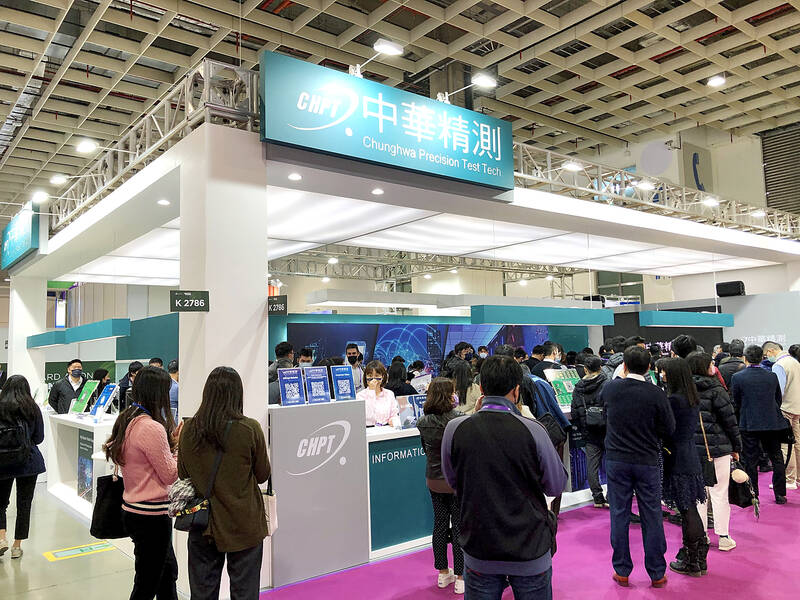Chunghwa Precision Test Technology Co (CHPT, 中華精測), a chip testing and wafer probing services provider, yesterday said the effect of Washington’s potential tariff hikes would be minimal as only a small portion of its products would ship directly to the US.
The company in 2022 upgraded its unit in San Jose, California, into a subsidiary and quadrupled capacity at a factory there to cope with customers’ demand for testing artificial intelligence (AI) chips and smartphone processors, CHPT president Scott Huang (黃水可) said.
“Only a small fraction of our shipments go directly to the US. A majority of our testing capacity is in Taiwan,” Huang said, adding that most chips made in Taiwan are usually assembled with hardware and then shipped to destinations worldwide.

Photo: CNA
The company expects North America, which houses the world’s major AI chip suppliers such as Nvidia Corp, to be a rapidly growing market, thanks to the AI boom, Huang said.
To better serve its customers there, the company’s board of directors on Tuesday approved a plan to provide its North American team with more power and financial resources, he said.
North America last year replaced Taiwan as the biggest revenue source for the company, making up about 60 percent of its total revenue compared with 30 percent in 2023, while China only accounted for 10 percent, he said.
CHPT is positive about this year, given the robust testing solutions business, including testing of advanced load boards and probe cards amid strong demand for high-performance computing and AI applications, Huang said.
The company expects “better-than-seasonal” performance during the first two quarters with an annual growth in revenue, extending the strong momentum from the final quarter of last year, he said.
The first two quarters of a year are usually the slack season for the electronics industry, he said.
Huang said CHPT employees had to work overtime during the nine-day Lunar New Year holiday to meet customer demand.
“Our factory utilization continues to be at a high level, approaching full capacity,” he said. “The equipment utilization for load boards would be full until April.”
“The first quarter is likely to be the strongest first quarter in the company’s history,” he added.
CHPT supplies advanced load boards used to test advanced wafers, which Taiwan Semiconductor Manufacturing Co (台積電) makes for Nvidia and other companies.
Net profit last quarter surged to an all-time high of NT$322 million (US$9.8 million), compared with NT$17.47 billion a year earlier, while on a quarterly basis, net profit doubled from NT$107 million, the company said.
Earnings per share (EPS) rose to NT$9.83 last quarter from NT$0.53 a year earlier and NT$3.25 a quarter earlier.
For the whole of last year, net profit soared to NT$510 million from NT$32.6 million in 2023, while EPS rose to NT$15.55 from NT$0.99.
The board of directors has approved a proposal to distribute a cash dividend of NT$7.8 per share, representing an about 50.16 percent payout ratio, the company said.

GROWING OWINGS: While Luxembourg and China swapped the top three spots, the US continued to be the largest exposure for Taiwan for the 41st consecutive quarter The US remained the largest debtor nation to Taiwan’s banking sector for the 41st consecutive quarter at the end of September, after local banks’ exposure to the US market rose more than 2 percent from three months earlier, the central bank said. Exposure to the US increased to US$198.896 billion, up US$4.026 billion, or 2.07 percent, from US$194.87 billion in the previous quarter, data released by the central bank showed on Friday. Of the increase, about US$1.4 billion came from banks’ investments in securitized products and interbank loans in the US, while another US$2.6 billion stemmed from trust assets, including mutual funds,

AI TALENT: No financial details were released about the deal, in which top Groq executives, including its CEO, would join Nvidia to help advance the technology Nvidia Corp has agreed to a licensing deal with artificial intelligence (AI) start-up Groq, furthering its investments in companies connected to the AI boom and gaining the right to add a new type of technology to its products. The world’s largest publicly traded company has paid for the right to use Groq’s technology and is to integrate its chip design into future products. Some of the start-up’s executives are leaving to join Nvidia to help with that effort, the companies said. Groq would continue as an independent company with a new chief executive, it said on Wednesday in a post on its Web

JOINT EFFORTS: MediaTek would partner with Denso to develop custom chips to support the car-part specialist company’s driver-assist systems in an expanding market MediaTek Inc (聯發科), the world’s largest mobile phone chip designer, yesterday said it is working closely with Japan’s Denso Corp to build a custom automotive system-on-chip (SoC) solution tailored for advanced driver-assistance systems and cockpit systems, adding another customer to its new application-specific IC (ASIC) business. This effort merges Denso’s automotive-grade safety expertise and deep vehicle integration with MediaTek’s technologies cultivated through the development of Media- Tek’s Dimensity AX, leveraging efficient, high-performance SoCs and artificial intelligence (AI) capabilities to offer a scalable, production-ready platform for next-generation driver assistance, the company said in a statement yesterday. “Through this collaboration, we are bringing two

Even as the US is embarked on a bitter rivalry with China over the deployment of artificial intelligence (AI), Chinese technology is quietly making inroads into the US market. Despite considerable geopolitical tensions, Chinese open-source AI models are winning over a growing number of programmers and companies in the US. These are different from the closed generative AI models that have become household names — ChatGPT-maker OpenAI or Google’s Gemini — whose inner workings are fiercely protected. In contrast, “open” models offered by many Chinese rivals, from Alibaba (阿里巴巴) to DeepSeek (深度求索), allow programmers to customize parts of the software to suit their